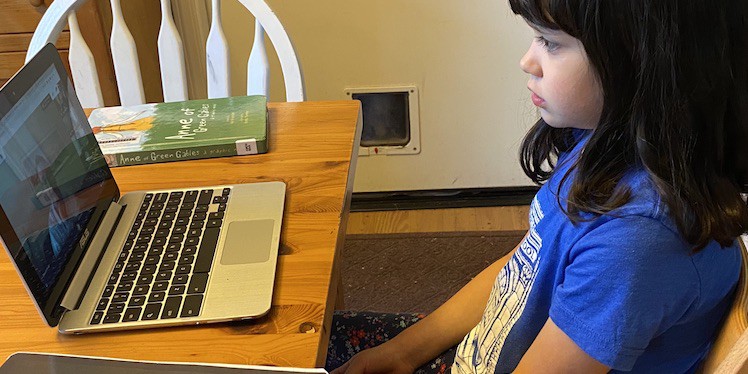
A snapshot of what online instruction looks like for Portland parents.
Scroll through your favorite Portland parenting Facebook group and the frustration from parents attempting to help their children navigate online distance learning practically jumps off the screen. Some commenters point out that what we Portland parents are doing is not homeschooling, but facilitating distance learning during a crisis — sometimes for multiple grade levels, sometimes for children with special needs and often while trying to work remotely, or outside of the home.
Most parents did not ever see themselves homeschooling. And if they did, it did not look like this. “I always pictured it as exploring OMSI with friends, adventuring in the gorge on a hike, participating in sports and music classes, and learning about animals at the zoo,” says Jessica Wade, mother of a first grader and a preschooler, an occupational therapist and owner of The Wiggle Room in Northeast Portland. “Doing it all without any outside support and without being able to explore our amazing city is not how I would describe homeschooling.”
Nadia Hasan Syed, a former teacher with a 5-year-old and 8-year-old at home started adhering to a loose schedule for her kids and providing lessons on reading and math as soon as schools shuttered. “We didn’t wait for online instruction because #realitycheck, we are both working parents and need to get things done and our kids need more support and supervision than older kids may.”
After online instruction rolled out, Hasan Syed initially stuck to her own lessons because it was easier for her. She also noted her frustration with trying to get a Chromebook from the Beaverton School District. She did not get one for three weeks and knew other families had received them before then. But Hasan Syed says she is now getting the hang of online instruction.
Private online lessons rolled out before PPS instruction
Tia Kauffman, whose 7-year-old son attends CLASS Academy in Northwest Portland, said instruction for her son started immediately, not on April 6, when Portland Public Schools officially rolled out online instruction. Kauffman says there were bumps along the way, but the private school took input from parents. “Because 70 percent of the families at our school have two working parents, the school by week 3 had designed assignments that need little to no parent help,” says Kauffman. “The assignments that need some supervision (e.g. simple science experiments or walks in the neighborhood to do a nature bingo) have flexible due dates because the teacher knows our time to help is limited.”
And Kauffman says her second-grade son can complete his assignments entirely on his own and feels her family’s experience has been different from her friends whose children attend public school. “Our son’s learning is still advancing,” she says.
Kauffman also adds that her son’s teachers saw the need for students to be able to interact socially, so they started providing daily Zoom social time and Friday afternoon dance parties in addition to educational assignments.
You’re not the only one whose kid has not finished all the assignments
Grandparent help and understanding co-workers are making distance learning manageable for Jenn Basaraba, a single parent with a son at Touchstone Preschool in Tigard. “I am blessed beyond measure to have my mom support me through all this,” says Basaraba. “We split time daily — she gets am and I get pm or vice versa. I structure and block my calls/meetings at work the best that I can, so that I have most of my meetings during the part of day when my mom has him.” And Basaraba, who now works from home managing a team of underwriters for an commercial insurance company that is extra busy with small business claims, says that from the top down her company has been extremely supportive.
And a month into distance learning, Basaraba loves her preschooler’s mostly play-based lessons. “I pick and choose what activities I am able to do with him, or my mom can do with him, and leave ones I don’t care about.”
And that’s a common thread among most parents interviewed for this piece. Most say that their kids are only doing some of the online assignments. Michelle Smario has a high school freshman who has special needs, a third grader and a 2-year-old at home. “I have chatted with most of the teachers and explained my current situation and try to explain delays or struggles there might be,” says Smario whose partner works nights at an essential job and needs to sleep during the day.
Katie Campos, a preschool teacher whose daughter attends kindergarten at the culturally responsive charter school KairosPDX, feels overwhelmed by the number of assignments posted — and their ability to finish them all. Campos’s daughter got frustrated by watching the assignments online, so Campos now watches the assignments and then teaches them to her kindergartener herself.
Lisa Ostrowki’s TAG-identified first-grade daughter was slowed down by unfamiliarity with typing on a computer, so Ostrowski stopped online instruction and gave her daughter a second-grade workbook instead. Ostrowksi also worries about the inequity of online instruction. “I think that school should be dropped for the most part and picked back up in the fall. There are so many kids that can’t access online education for too many different reasons to list. Parents and children do not need more pressure. There is plenty of that already.”
Teacher appreciation
Despite Katie Campos’s difficulties in helping her daughter complete all the assignments, she and many of the other parents interviewed for this piece very much appreciate the efforts of teachers who had to abruptly pivot to teaching online. “Our teachers at Kairos are doing an amazing job,” says Campos. “What I love most is that not just her teacher has checked in, but so many other staff members. And all are making videos, so there are options if you need a mindfulness activity, PE activity or science project. The principal really sets the tone of the day having a morning assembly every morning.”
Jessica Wade echoes the thanks. “I see (virtually) teachers working long hours, creating videos, learning new ways of instruction, rubbing their eyes with exhaustion from all the computer time, making phone calls, sending emails, all while managing their own families, not to mention the uncertainties of our world,” she says.
Some silver linings
Despite the difficulties many parents have had with online instruction, they have found some unanticipated positives during this time. “Our son has always struggled with handwriting” says Wade “As an occupational therapist I know how to work on it, but making the time to do it and fit it in was always challenging. This time has given us an opportunity to work on handwriting in a fun way.”
Michelle Smario says that an unexpected perk during this time is that both of her school-age children enjoy having less pressure in their lives. While Nadia Hasan Syed appreciates seeing her kids getting along and becoming more creative and thoughtful.
“[My son] loves the extra time with me,” says Jenn Basaraba. “We can take midday bike rides, we never got to do that before. I cherish the wins and don’t let the things we don’t get to bug me. It’s not all rainbows and kittens, but we are surviving.”
- Where to Get Our Favorite Chopped Sandwich in Portland - March 10, 2024
- 6 New Portland Summer Camps - March 7, 2024
- Get Serious Air at This Indoor Portland Park - February 19, 2024


